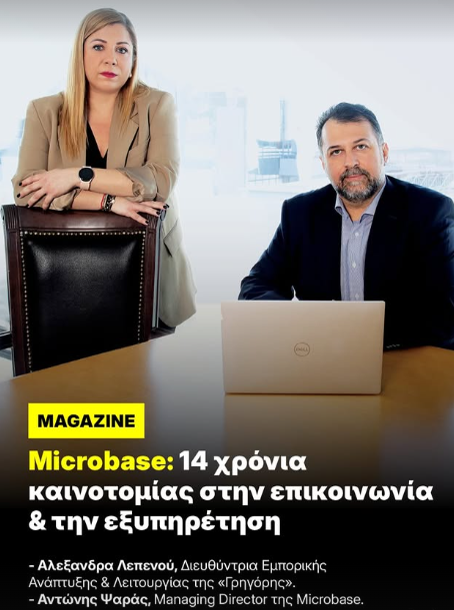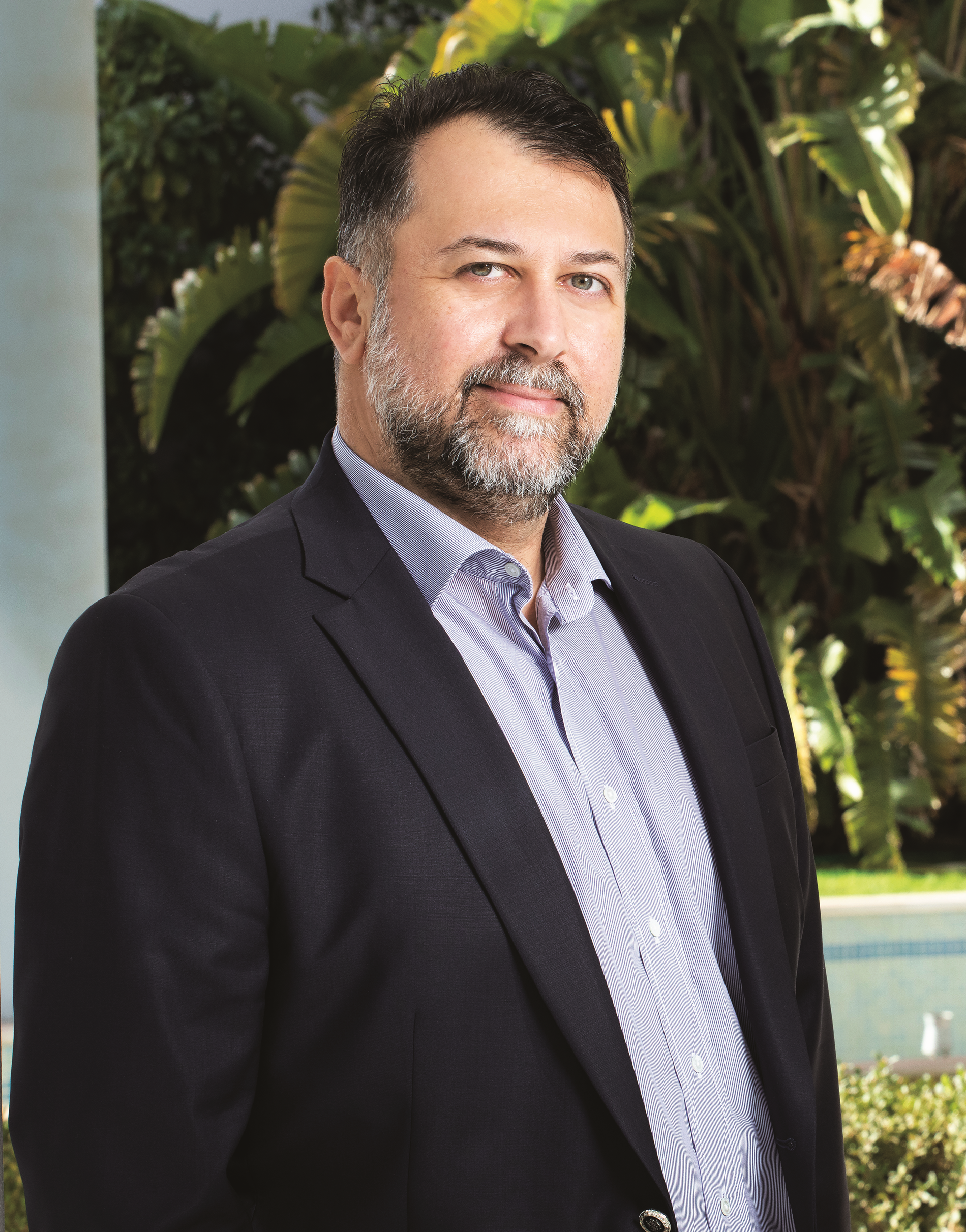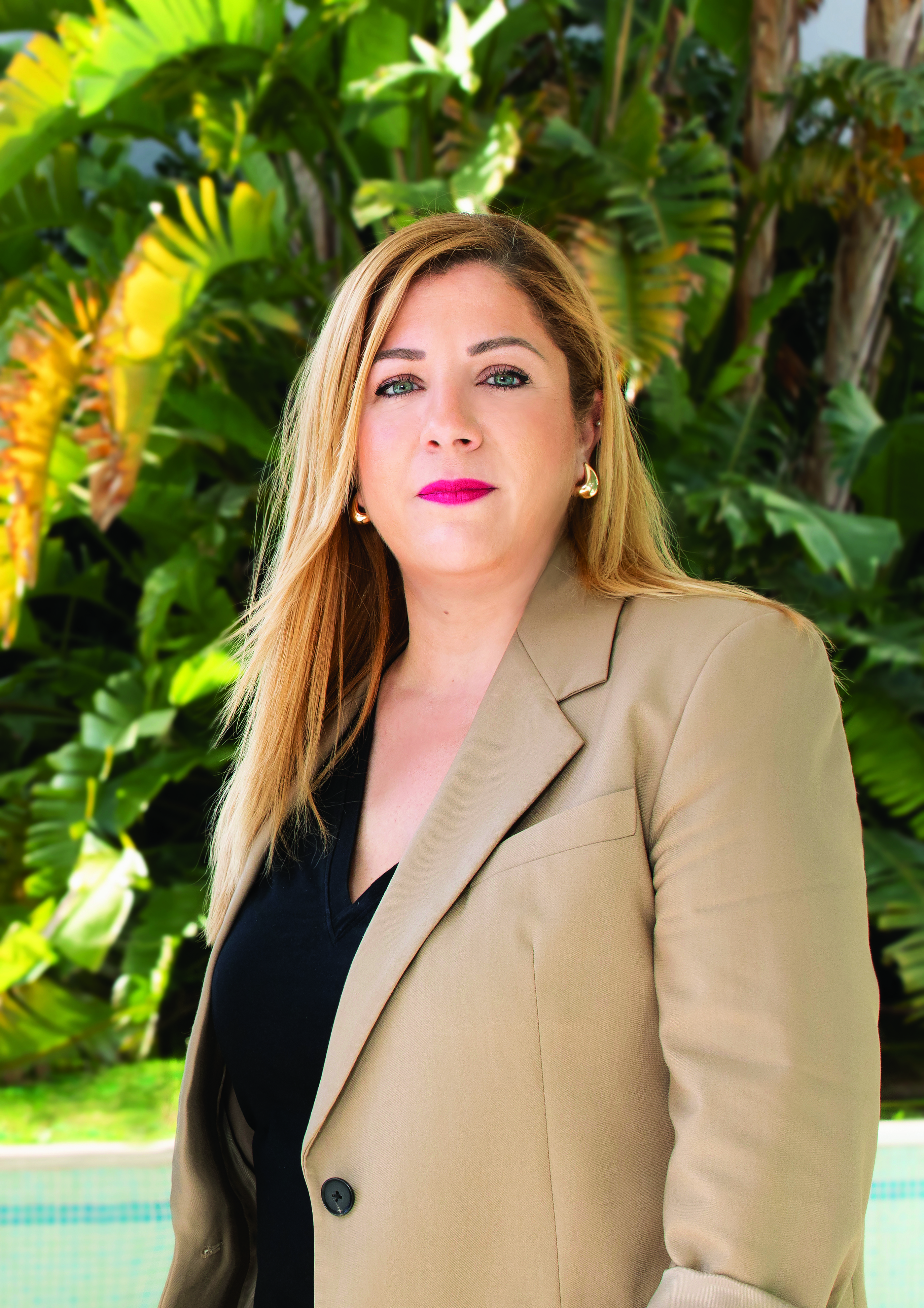March 2025
From phone ordering to a fully cloud-based call center, Microbase and Gregory’s adapt new technological data to modern consumer experiences and modernize daily communication with their customers.
A hot cup of coffee, a freshly baked snack, a phone call. The daily life of thousands of Gregory’s consumers passes through simple, almost self-evident movements. Behind them, however, lies a communication mechanism that has evolved over the years, transforming the management of ordering into an efficient and seamless experience.
On this journey, Microbase has been a strategic partner of Gregory’s since 2011. Antonis Psaras, Managing Director of Microbase, and Alexandra Lepenou, Director of Commercial Development & Operations of Gregory’s, speak to Fortune Greece about the evolution of their collaboration, the power of technology and the major changes in the catering and telecommunications industries.
How did Microbase’s collaboration with Gregory’s begin and how has it evolved?
Antonis Psaras: Our collaboration with Gregory’s has been going on for 14 years. The recommendation was made by another satisfied customer of ours, in the field. This is the greatest reward for us; to have satisfied customers at such a level that they recommend us to others. At that time, Gregory’s provided the possibility of ordering by phone by calling each store separately and was looking for a solution for centralized call management with distributed receipt of the order from the stores in order to maintain a good customer-store relationship. You understand that the challenge was great and as engineers we love challenges. Thus, we created a central call management infrastructure, so that in combination with GIS, order-taking and other systems we could identify the most suitable store based on location and workload/availability, to serve the customer, routing the call to it. The result was the optimization of the customer experience, increased productivity, improved speed and availability of service, as well as improved customer engagement.
Alexandra Lepenou: Our collaboration with Microbase began when we decided to upgrade our delivery services, creating a single call center. Until then, each store managed its calls separately, which affected service. Looking for a reliable partner, Microbase provided us with a comprehensive solution that improved call management, efficiency and customer experience. Our collaboration is constantly evolving, adapting to market needs.
What were the biggest challenges you faced during the transition to contact center technologies?
A.P.: Usually the biggest difficulty in contact center solution implementation projects is the receptivity and adaptability of people to a more structured form of service. In the case of Gregory’s, this was not a problem. The team that took over the central service and operation was receptive from the beginning and faced the change positively. The biggest challenges were mainly technical ones due to limitations of telecommunications providers. For this reason, the initial implementation was done on On-Premise infrastructures with TDM lines, although at that time Voice over IP technology was in operation. In addition, the inability of providers to reroute branch calls to the central infrastructure forced us to proceed with various emergency solutions in order to achieve the desired result. Gradually, the above problems began to subside as providers expanded the use of Voice over IP throughout their network, allowing us to proceed with a gradual transformation of the infrastructure from an on-premise solution initially to Hybrid cloud and then to fully cloud. Today, Gregory’s installation is entirely in the Microbase cloud, using the telecommunications provider of their choice.
A.L.: The transition to a fully cloud solution for our call center during the pandemic was a big challenge, as when the lockdown was announced we had to ensure within one day that our team would operate seamlessly from home. Considering that the call center was our main communication channel and main source of revenue, we had to ensure that our large team would be coordinated and operate seamlessly from home. Microbase responded immediately, offering technological support, speed and flexibility, and thus we managed to face this challenge successfully.
“A long-term partnership requires trust, respect and understanding”
Antonis Psaras, Managing Director, Microbase
How does Microbase respond to customers with very high demands, such as Gregory’s?
A.P.: One of the advantages of our solutions is that we are the manufacturers of the Exelysis platform. This gives us the ability to adapt our solutions to the needs of our customers. But −the most important− is the in-depth knowledge of the subject that allows us to propose solutions to achieve the best result. In the case of Gregory’s, this was evident in three main areas. At the level of technology and its adaptation to the specific requirements and limitations that existed from telecommunications providers. It is characteristic that Gregory’s has tested all major providers, has implemented all interconnection technologies and has gone through all infrastructure models (on-premise, hybrid and cloud).
Correspondingly, at the software level, the interface with many different systems and technologies is essential. And in this case, Gregory’s followed the evolution of technology and technological trends, starting from on-premise implementations and ending today with a fully cloud implementation. At the level of monitoring tools and statistical reports that were developed according to Gregory’s requirements, in order to provide immediate and valid information to the operations team and management, in order to be able to make the right strategic decisions to maximize their customer satisfaction.
The role of the call center is crucial for delivery ordering. What technological capabilities of Microbase contributed to the optimization of this process?
A.L.: Microbase gave us the opportunity to transform our call center into a flexible and efficient tool, in the following ways.
- Reporting allows us to monitor productivity and service times, improving order management.
- Through custom implementations, we acquired the ability to centralize ordering for stores.
- The ability to use different messages either per region or per store gives us the advantage of personalized communication.
- Through the call routine, we unified the customer databases from online and telephone orders, into a single service.
How has the Exelysis platform improved the company’s productivity and customer experience?
A.L.: Initially, we defined key KPIs through the statistical data of the reports, such as call response, wait time and the percentage of unanswered calls. As a result, today we have reduced unanswered calls to below 1% and 85% of calls are answered within 30 seconds. In addition, the analysis of the reports helped us improve the allocation of resources, adjusting agent shifts based on hourly calls. Finally, we connected Microbase’s flexible reporting with our BI tools, so as to shape our strategy, emphasizing customer excellence.
How do you ensure GDPR compliance and the protection of your customers’ personal data?
A.L.: For GDPR compliance and personal data protection, Gregory’s applies the principle of minimization and collects only the information that is absolutely necessary. Gregory’s takes all necessary technical and organizational measures for the security of systems and data (firewalls, authorized access, etc.). Call center agents are trained and regularly inspected on system and personal data security issues. Furthermore, by signing a Data Processing Agreement (DPA), the company binds third-party partners to comply with the GDPR Regulation. Finally, customers are clearly informed of their rights (possibility of access, correction or deletion of data, etc.).
“Technology will redefine the catering and telecommunications industries” Alexandra Lepenou, Director of Commercial Development & Operations, Gregory’s
What is the added value of a multi-year partnership like yours and how does it contribute to your long-term business development?
A.P.: For Microbase, developing multi-year partnerships is an end in itself, as we invest significantly in after-sales support with a human-centered approach. A long-term partnership requires trust, respect and understanding, characteristics that allow the development of prototypes and their testing in real conditions. Thus, as Microbase evolves its solutions to meet market needs, Gregory’s reaps the benefits of these solutions.
A.L.: The added value of our multi-year partnership is trust, reliability and quick response. These three strong “values” ensure us effective support and immediate problem resolution. And it is a fact that our collaboration with Microbase contributes to long-term business development, through strengthening innovation and continuous improvement of processes with consistency and speed.
What technological innovations or services do you plan to incorporate in the future to further strengthen your collaboration?
A.P.: As in all sectors, AI is the new tool that drives developments in telecommunications. Technologies such as voice gateways with natural speech recognition and trained large language models are now part of the Microbase platform. In addition, technologies that extract meta-information from voice dialogues and allow the evaluation of communications are used in our platform to provide data for improving service and the customer experience. I believe that we will soon see some of these solutions on Gregory’s platform.
A.L.: In the future, we plan to integrate AI automated solutions, which will improve the experience of both franchisees (B2B) and consumers (B2C). Microbase has presented us with a variety of proposals in this direction from time to time and we are in the process of evaluating them. These technologies will allow for faster service, personalized suggestions, improved processes, and will create growth opportunities.
With the increasing emphasis on digital transformation, how do you see the role of technology shaping the hospitality and telecommunications industries?
A.P.: It is not easy to predict the evolution of the hospitality industry in relation to digital transition and transformation. One could easily predict that all communication will be transferred to digital assistants, transformed into e-commerce with minimal phone calls and other similar scenarios. My view is that voice communication between people will gain greater value. Companies that will offer services with physical servers will provide their products and solutions as “Premium”. For this reason, Microbase will continue to invest in Man, providing all the technological tools to do their job better.
A.L.: I believe technology will redefine the hospitality and telecommunications industries through automation, personalized experiences and optimized customer service. AI, IoT and big data will enhance efficiency, while cloud-based solutions will accelerate the adoption of smart services.
The interview was published in the March 2025 issue of Fortune Greece (in Greek)



